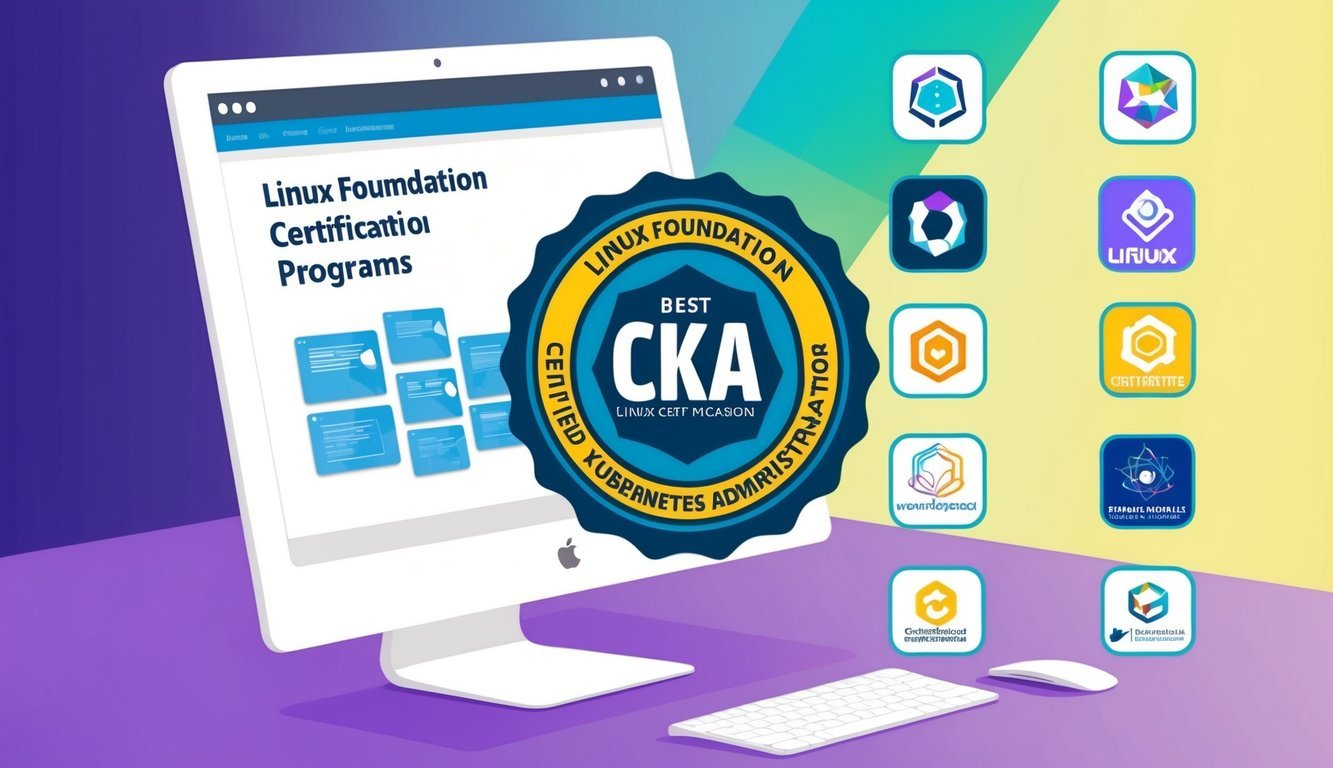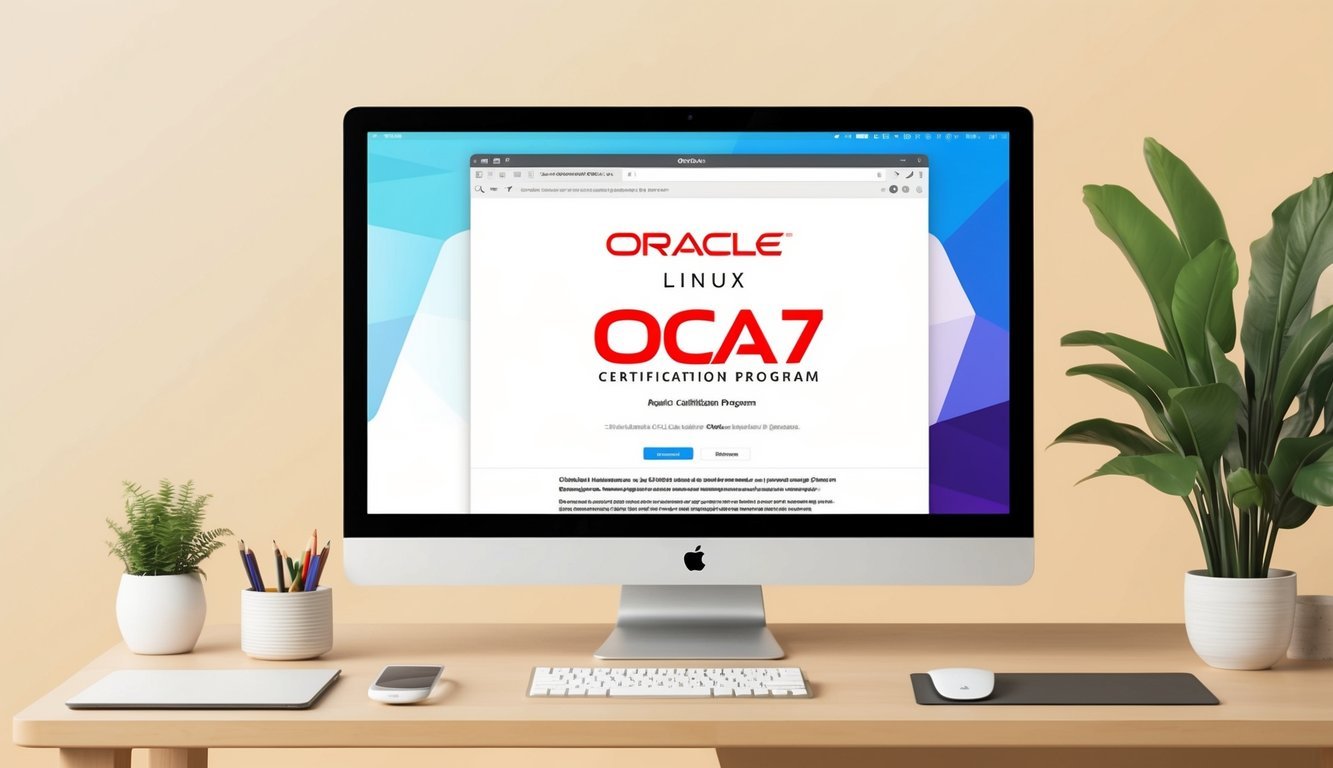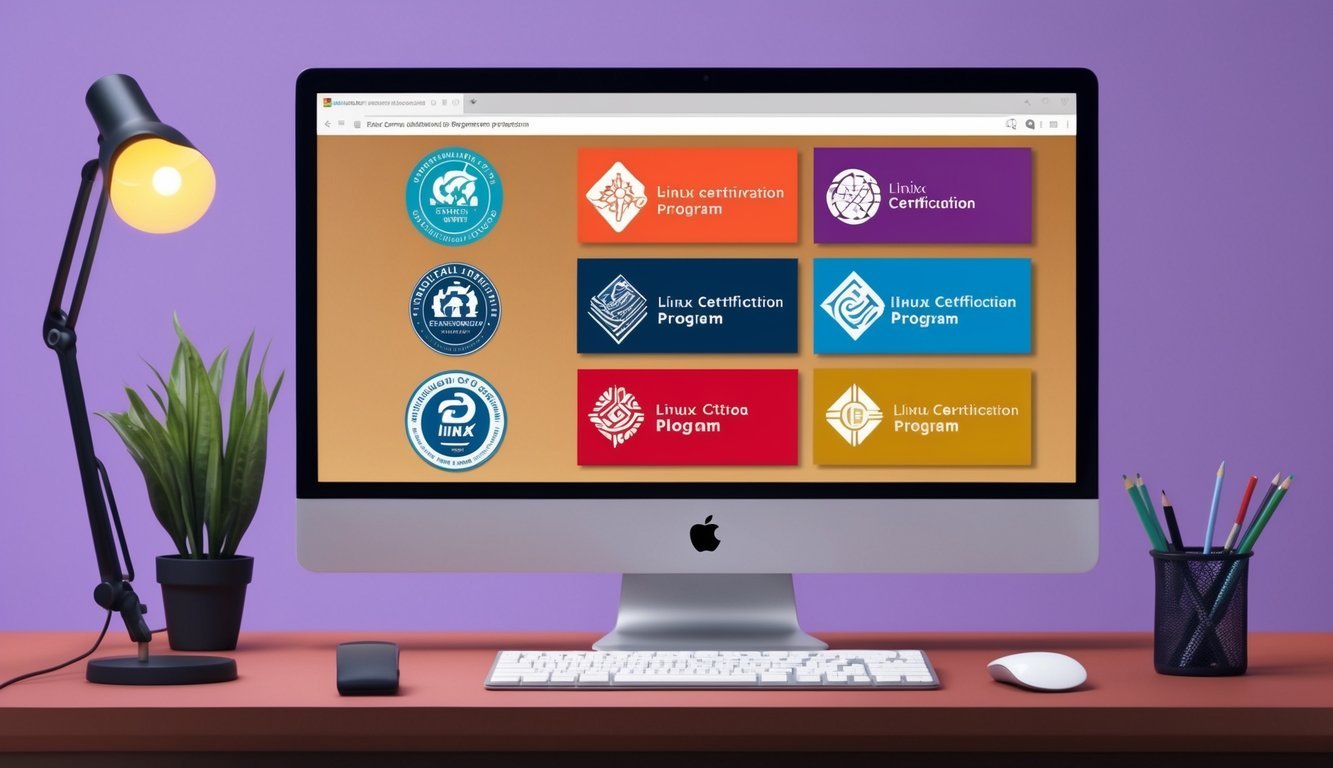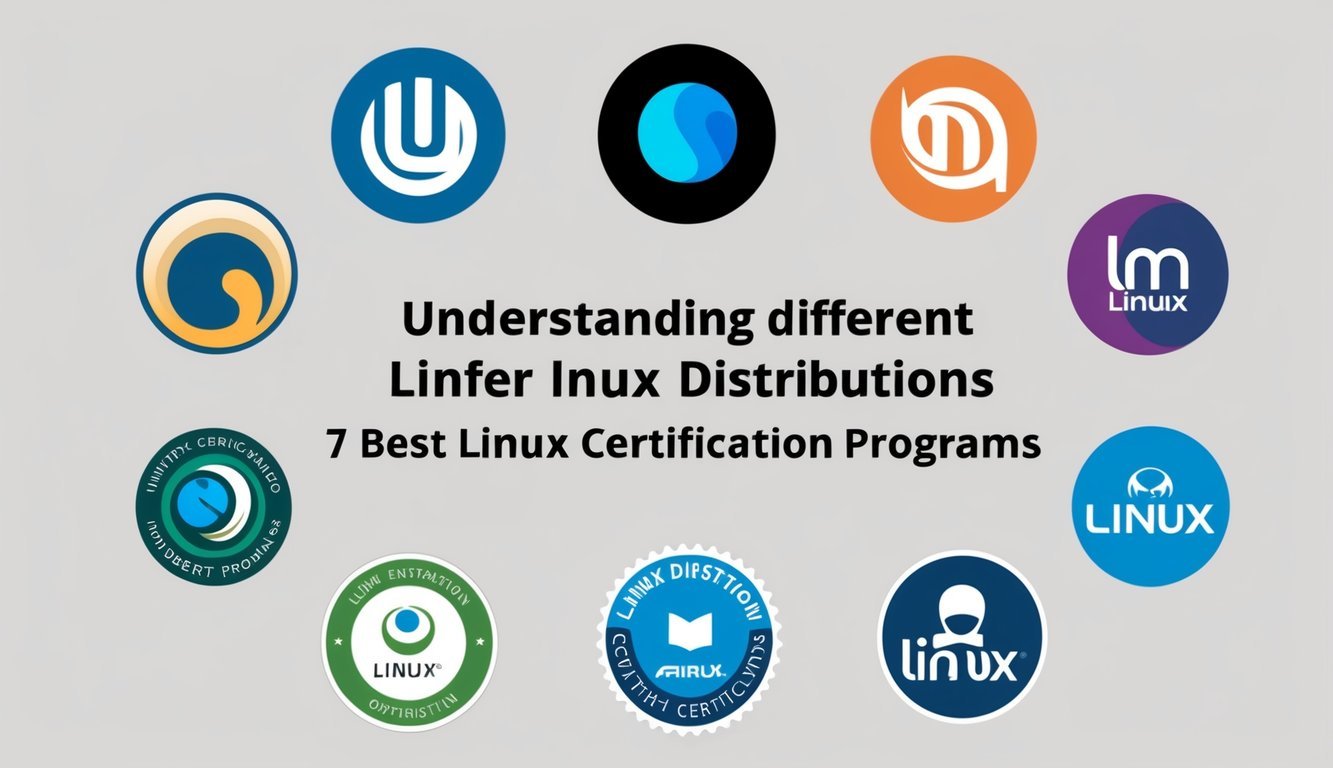Linux skills are hotter than ever in the tech industry! Companies are on the hunt for workers who can navigate this open-source operating system with confidence.
Want to catch their eye during your job search? A Linux certification might just be your golden ticket.

With a plethora of Linux certification programs available, choosing the best one is like picking a favorite ice cream flavor—each offers something unique, and your choice depends on what you’re craving. Finding the right Linux certification can give your career and earning potential a serious boost. Some programs cater to beginners, while others tackle advanced topics, so think about what you want to achieve and where you stand in your journey.
1) Red Hat Certified Engineer (RHCE)
Looking to crank up your Linux skills? The Red Hat Certified Engineer (RHCE) certification might be just what the tech doctor ordered! This program is highly regarded and proves you’ve got some serious Linux know-how.
As an RHCE, you’ll become a whiz at managing systems, users, and security protocols.
You’ll also master the art of automating tasks with Ansible playbooks—think of it as being the wizard behind the curtain, ensuring everything runs smoothly with minimal effort.
But brace yourself: the RHCE exam isn’t a walk in the park.
You’ll need to show off your skills in a hands-on test, which can be quite the adventure.
If you’re already certified as a Red Hat Certified System Administrator (RHCSA), you’re ahead of the game.
Got an older RHCE cert? No worries! You can recertify to keep your automation game sharp and dive into container systems like a pro.
Employers love seeing RHCE on a resume—it tells them you’re ready for the big leagues in managing complex Linux systems.
2) CompTIA Linux+
Want to level up your Linux skills? The CompTIA Linux+ certification might be just the fit for you! This vendor-neutral program gives you the essential skills to tackle Linux administration.
In this exam, you’ll flex your knowledge on command line working, storage management, and application usage—all the nitty-gritty details that make Linux tick.
This certification is regularly updated to align with the latest trends in technology, including cloud computing and automation.
Employers respect Linux+ because it demonstrates you can handle real-world Linux situations.
To help you prep, check out CompTIA’s CertMaster Learn.
It’s an online course that lets you study at your own pace, perfect for those juggling work, school, and life.
The exam features around 90 questions and lasts about 90 minutes—score at least 80% to pass.
Remember, having this cert might just open the door to exciting new job opportunities in the IT world.
3) Linux Foundation Certified System Administrator (LFCS)
Ready to prove your Linux skills? The Linux Foundation Certified System Administrator (LFCS) exam is the real deal! This hands-on test immerses you in real-world scenarios.
You’ll tackle tasks that sysadmins face every day—no multiple-choice questions here! The exam covers everything from essential operations to service configuration and storage management.
Plus, it’s distribution-neutral, so you can pick the Linux flavor that suits you best.
Whether you’re a newbie or a seasoned pro, this cert can help validate your ability to handle actual admin duties.
And let’s be real: the recognition you get worldwide can do wonders for your career!
4) LPIC-1: Linux Administrator

Looking to prove your Linux skills? The LPIC-1 certification could be your first big step! This is the entry point into the Linux Professional Institute’s certification path.
This cert shows you can manage basic Linux admin tasks like working with the command line, setting up systems, and managing networks.
It’s a two-part exam, where you’ll need to ace both sections to get certified.
The LPIC-1 is fantastic because it’s not tied to any one Linux distribution.
This means the skills you learn can be applied across various Linux environments.
Employers really value this certification, as it signals you have a solid foundation in Linux—and it sets you up for more advanced certs if you’re looking to continue your journey.
5) Linux Foundation Certified Kubernetes Administrator (CKA)

Want to take your cloud computing career to the next level? The Certified Kubernetes Administrator (CKA) certification might be what you’re looking for!
This globally recognized program tests your ability to manage Kubernetes clusters.
And since it’s vendor-neutral, you can apply your knowledge across various cloud platforms.
The CKA exam is hands-on; you’ll face real-world problems so you can flex those problem-solving skills.
You have 12 months to schedule and take the exam, and you’ve got two attempts—time to polish up your skills! Plus, the Linux Foundation offers two simulation attempts to help you practice.
Getting CKA certified tells employers you’re ready to handle Kubernetes tasks with confidence.
It’s a fantastic way to shine in the competitive tech job market.
6) SUSE Certified Engineer

Looking to elevate your Linux skills? The SUSE Certified Engineer (SCE) program might be just what the doctor ordered! This cert is aimed at advanced system operators and consultants working with SUSE Linux Enterprise Server.
With the SCE certification, you’ll show that you can tackle complex Linux configurations.
You’ll learn how to architect and manage tricky setups that go beyond the basics.
Before jumping into the SCE, it’s a good idea to grab the SUSE Certified Administrator certification; it’ll give you that solid foundation you need.
Once you’ve got your SCE, you’ll be ready to tackle the really tough Linux challenges—and of course, stand out in the job market.
7) Oracle Linux OCA

If you’re itching to get certified in Oracle Linux, the Oracle Certified Associate (OCA) program might be the right fit! This cert is perfect for newcomers wanting to lock down their Linux skills.
This certification proves you understand Oracle Linux 8 inside and out.
You’ll cover everything from system setup to user management and basic networking.
It’s a fantastic launchpad for diving into more advanced Oracle certs later on.
To earn your OCA, you just need to pass a single exam.
It covers key aspects like installing Oracle Linux, managing files, and working with the command line—not too intimidating, right?
The exam has about 60 questions, and you’ll have 90 minutes to complete it, aiming for a score of at least 61% to pass.
Once you’ve got your OCA, you’ll be primed for the next big step in your Linux journey.
Plus, it’ll make your resume pop!
Why Choose Linux Certification?

Linux certifications can give your tech career a real lift and help you stand out to potential employers.
These certs show you’re the real deal when it comes to navigating this popular open-source operating system.
Benefits for Your Career
Getting certified in Linux can unlock new job opportunities and make you shine when applying for IT roles.
Many companies rely on Linux systems, and having a certification shows you’re ready to hit the ground running.
Linux experts are in high demand—having that certification could lead to a better salary too! It shows you’re serious about advancing your skills.
Certifications also help keep your knowledge fresh amid the fast-paced tech industry.
Staying up-to-date means you can stay competitive and show you’re committed to ongoing learning and career development.
Many IT professionals also explore related fields, such as solar installation certification programs, to broaden their skill set and career options.
Being informed and certified keeps you in the game whether you’re in traditional IT roles or newer tech sectors.
Demand in the Industry
Linux is everywhere in tech—from cloud computing and servers to even smartphones.
This huge presence means there’s a sky-high need for Linux pros.
Big-name tech companies run on Linux and are constantly looking for skilled admins and developers. Red Hat certifications are particularly valued in enterprise environments.
The rise of cloud computing has made Linux skills even more critical.
As businesses transition to the cloud, they need people who can manage Linux systems with ease.
Plus, Linux plays a major role in cybersecurity—many security tools operate on Linux. certified experts are crucial for protecting networks and data.
Understanding Different Linux Distributions

Linux comes in many flavors, each with its own unique flair and purpose.
These variations are known as distributions—or “distros” for short.
Let’s take a peek at some popular ones and how to choose the right one for your certification adventure.
Popular Distros in Certification
When it comes to Linux certifications, certain distros tend to shine brighter than others. Red Hat Enterprise Linux (RHEL) dominates the business world and is the focal point of Red Hat’s certification programs.
Ubuntu also ranks high on the list; it’s user-friendly and perfect for those just starting out.
The CompTIA Linux+ exam includes Ubuntu, making it accessible to beginners.
CentOS, based on RHEL, is a free option often found in server environments.
Debian, the granddaddy of many distros, is also known for its stability and security—definitely worth a look!
Choosing the Right Distro for Certification
Choosing the right distro for your certifications is like picking the right shoes for a hike—it all depends on where you want to go! If you’re eyeing a Red Hat cert, focus on RHEL or CentOS; they’re like two peas in a pod.
For a more general cert like Linux+, Ubuntu might be the way to go.
It’s user-friendly and easy to navigate, which can help you learn faster.
If you’re completely new to Linux, why not start with a beginner-friendly distro like Ubuntu or Linux Mint? Both have tons of beginner resources to help you on your journey.
Remember, the skills you pick up on one distro often translate to others.
Once you nail the basics, switching between distros becomes a breeze!
Frequently Asked Questions

Figuring out which Linux certification is right for you can feel like trying to choose a pizza topping—there are just so many options! Let’s tackle some common questions to help you chart your course.
Which Linux certificates are best for a newbie?
If you’re just dipping your toes into Linux, I’d recommend starting with something beginner-friendly.
The CompTIA Linux+ is a fantastic option for newbies, covering core Linux skills without requiring any prior experience.
Another excellent choice is the LPIC-1: Linux Administrator certification.
What’s the certification path for Linux pros?
For seasoned Linux users, aim for the stars! The Red Hat Certified Engineer (RHCE) is a top-tier option; it shows you can handle complex Linux tasks.
You might also consider the Linux Foundation Certified System Administrator (LFCS) to amp up your skills.
Are there any Linux certifications I can grab for free?
Free Linux certifications are a bit like finding a unicorn; they’re rare, but not impossible! Keep an eye out for free training materials and practice exams online.
Some companies offer introductory courses at no cost.
While full certs usually come with a fee, you can still learn plenty without dipping into your wallet.
How does CompTIA Linux+ stack up against other certs?
CompTIA Linux+ is well-regarded across the industry.
It’s vendor-neutral, meaning you’ll get a solid grasp of general Linux skills, making it a great choice if you’re unsure which Linux flavor you may be using at work.
Plus, it’s a dependable stepping stone for moving on to more advanced certifications.
What Linux certifications should DevOps engineers consider?
DevOps engineers should definitely look into cloud and container certifications.
The Linux Foundation Certified Kubernetes Administrator (CKA) is a fantastic fit, showcasing your ability to manage Kubernetes clusters—essential in many DevOps roles.
What should be my first Linux certification if I’m just starting out?
Your first Linux cert should reflect your experience and goals.
If you’re a total newbie, try CompTIA Linux+ or LPIC-1.
These certifications introduce the basics without assuming prior knowledge.
They’ll give you a solid start on your Linux journey!

